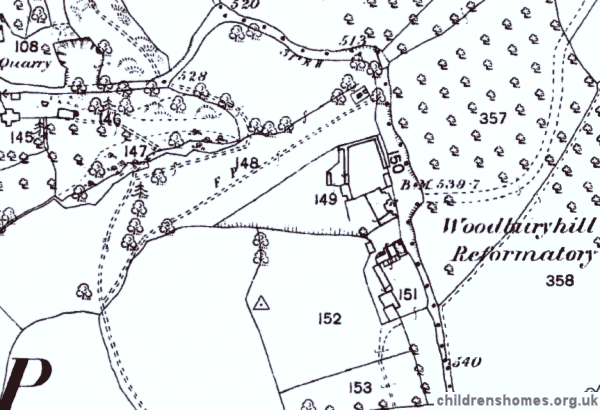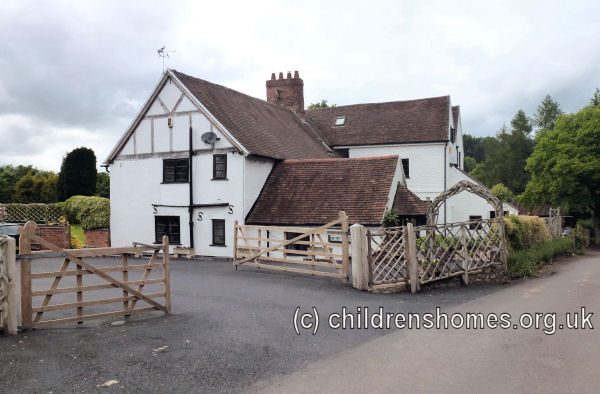Woodbury Hill Reformatory for Boys, Shelsley Beauchamp, near Worcester
The Woodbury Hill Reformatory for the County and City of Worcester was established in 1856 at premises at Camp Lane, Shelsley Beauchamp, near Worcester. The buildings — an adapted farmhouse — and fifteen acres of land were provided by Lord Ward (also known as Earl Dudley), who also contributed towards the School's running costs. On June 9th, 1856, the institution was formally certified under the Youthful Offenders Act to receive up to 32 boys committed by magistrates for detention. The institution was managed by the Rev. D. Melville, with its staff comprising a superintendent/chaplain (Rev. W.O. Griffiths), matron, assistant schoolmaster, labour master, and an occasional basket maker. The Rev. Griffiths also acted vicar of the small parish in which the School was located.
The School site is shown on the 1884 map below.

Woodbury Hill Reformatory for Boys site, Worcester, c.1884.
An early report criticised the use of the building's cellars as cells which were quite unsuitable for more than a few hours' detention.
In 1863, the post of superintendent was briefly held by another incumbent before passing to the Rev. Theodore Flintoff, who was to remain in charge for more than thirty years.
An inspection in 1863 noted that the School's farmland had been increased to 21 acres but as this included a good deal of pasture there was not enough under cultivation to provided sufficient work for the boys. It was recorded that 7 of the institution's former inmates were now in prison, suggesting that not enough was being done to provide for their employment and protection when leaving. Ten years later, the inspector was still complaining about the small extent of the farmland, together with the poor state of the outbuildings. A considerable amount of employment was being found on neighbouring farms, while some of the boys were still occupied in basket making. By 1884, the farmland had been increased to 35 acres which, together with a large garden, now kept the boys well employed.
On Friday, February 1st, 1895, a mutiny occurred at the Reformatory. Around 15 boys refused to leave their dormitory. Police were summoned and tried to gain access via ladders but were attacked with bricks pulled out of the walls. The police made a hole in the dormitory wall and when they finally gained admission, all the furniture was found to have been broken. The boys, who claimed to have a grievance against the labour master, were arrested and taken to a prison in Worcester. During a further visit by police the following morning, another group of boys barricaded themselves in their dormitory. While another small hole was being made in the wall, the boys were smashing bedsteads, tearing up bedclothes, pulling bricks from the wall, and piling any wood they could find onto the fire, apparently with the intention of setting the building alight. A gun was fired into the dormitory with the intention of scaring the boys. The first man to get through the hole was the labour master, who was showered with brickbats and seriously hurt. Eventually, a dozen men, including police officers, gained entry. After a fierce battle, during which more than twenty of the boys were injured, the rebels were subdued. The boys were then marched to the Hundred House and taken before a magistrate, who remanded them to Worcester. Only five boys remained at the institution, including one of the older youths whose sentence was almost up and had refrained from joining the rioters. The cost of the damage was placed at around £200. At a subsequent court hearing, the boys' defence was conducted by the Society for the Prevention of Cruelty to Children. The schoolmaster of the Reformatory admitted that during recent bad weather, the boys had been kept in a schoolroom from morning to night without a fire. It was also stated that some boys were punished by being confined in a cell that was six feet square, and sometimes placed there without shoes or stockings. The poor construction of the whole building, which made it very cold in sever weather, was also raised. Nonetheless, five of the ringleaders were sentenced to six weeks, and seven to a month's hard labour, with the rest being discharged.
Although 30 of the boys were returned to the Reformatory a few week later, it was decided that the reformatory would be closed. The establishment's contents, including 23 pigs, a cow, two donkeys, farm implements, beds and bedding, a harmonium and a sewing machine, were all sold by auction in March 1896.
The Reformatory's surviving premises now form part of Woodbury Old Farm.

Former Woodbury Hill Reformatory site, Worcester, 2013. © Peter Higginbotham
Records
Note: many repositories impose a closure period of up to 100 years for records identifying individuals. Before travelling a long distance, always check that the records you want to consult will be available.
- The National Archives, Kew, Richmond, Surrey, TW9 4DU.
File HO 144/368/B17201A — Woodbury Hill, Worcester. Mutiny by boys and closing of School. (1895)
Census
Bibliography
- Carpenter, Mary Reformatory Schools, for the Children of the Perishing and Dangerous Classes, and for Juvenile Offenders (1851, General Books; various reprints available)
- Carlebach, Julius Caring for Children in Trouble (1970, Routledge & Kegan Paul)
- Higginbotham, Peter Children's Homes: A History of Institutional Care for Britain's Young (2017, Pen & Sword)
- Abel Smith, Doroth Crouchfield: A History of the Herts Training School 1857-1982 (2008, Able Publishing)
- Garnett, Emmeline Juvenile offenders in Victorian Lancashire: W J Garnnett and the Bleasdale Reformatory (2008, Regional Heritage Centre, Lancaster University)
- Hicks, J.D. The Yorkshire Catholic Reformatory, Market Weighton (1996, East Yorkshire Local History Society)
- Slocombe, Ivor Wiltshire Reformatory for Boys, Warminster, 1856-1924 (2005, Hobnob Press)
- Duckworth, J.S. The Hardwicke Reformatory School, Gloucestershire (in Transactions of the Bristol and Gloucestershire Archaeological Society, 1995, Vol. 113, 151-165)
Links
- Red Lodge Museum, Bristol — a former girls' reformatory.
Except where indicated, this page () © Peter Higginbotham. Contents may not be reproduced without permission.


